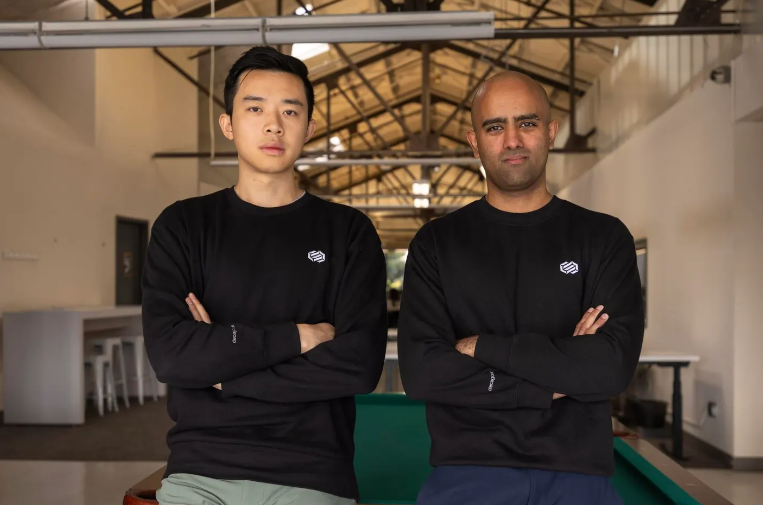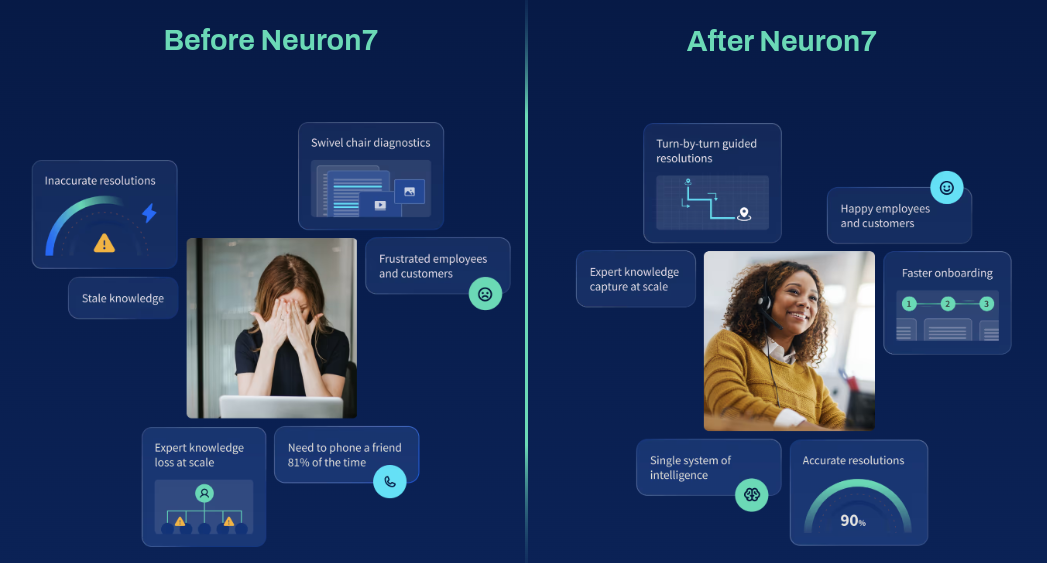 AI
AI
 AI
AI
 AI
AI
Artificial intelligence-powered customer service startups Decagon AI Inc. and Neuron7 Inc. both announced big funding rounds today, with the former closing on a hefty $65 million investment, and the latter raising $44 million.
Decagon said its Series B funding round was led by Bain Capital Ventures and saw participation from Elad Gil, A*, Accel, Bond Capital and ACME Capital, bringing its total amount raised to $100 million to date.
Meanwhile, Neuron7’s round was led by Smith Point Capital, the venture capital firm led by former Salesforce Inc. co-Chief Executive Keith Block, with participation from existing investors Nexus Venture Partners and Battery Ventures. The company has now raised $63 million in total.
Customer service has emerged as one of the most popular use cases for generative AI, with intelligent chatbots becoming commonplace in a number of industries. However, there’s a strong desire to make those chatbots even more humanlike than they are now, and that’s exactly what Decagon is trying to do.
The company, which raised $35 million in a Series A round just three months ago, says it offers a platform for building generative AI chatbots that work in the same way as humans do, going beyond just conversational responses. For instance, they can handle various tasks relating to customer support, such as creating tickets, processing complaints and so on.
Decagon says this enables its chatbots to service the entire customer support lifecycle, going beyond just having conversations with customers. They utilize complex business logic to reason and take action on behalf of customer support agents, analyze trends, create and update knowledge base articles, and more besides. In addition, their performance improves over time, based on the feedback from customers who engage with them.
The startup says its intelligent chatbots are the result of combining third-party large language models with its own, fine-tuned AI algorithms. It explained that it’s able to mix and match various types of model, or even combinations of multiple models, to find the best mix for different customer service-related tasks. The company continually experiments and tests these combinations of models to ensure it can provide the most helpful, friendly and accurate customer service chatbots around, free from inaccurate or toxic outputs.
According to Decagon, its AI models are transforming the role of human customer service agents. Instead of replacing those employees, most of its customers are transitioning them to higher-level roles, such as managing and overseeing the AI agents, instead of responding to customer tickets.
Decagon co-founder and CEO Jesse Zhang (pictured, left, alongside co-founder Ashwin Sreenivas) said many people believe AI is taking human’s jobs, but he firmly believes that’s not the case. “Our AI agents are enhancing jobs, not replacing them,” he insisted. “In a few years, every company will have AI agents running their customer experiences. Customer support staff are no longer fielding routine tasks; they are now becoming AI managers — configuring, training and overseeing the AI agents that handle repetitive work.”
The company cites the example of Ballarpur Industries Ltd., better known as Bilt, which is one of its biggest customers.
“Working with Decagon was like hiring 65 agents overnight,” said Thatcher Foster, vice president of customer services at Bilt. “We get 60,000 tickets per month. Seventy percent of those are being handled by Decagon’s AI agents. Our monthly savings are hundreds of thousands of dollars. Our agent teams became much stronger, and the ones we retain are real product experts.”
Decagon said the money from today’s round will help it to expand its engineering team and accelerate its go-to-market plans, while expanding into new industry verticals and additional modalities, such as voice.
As for Neuron7, it provides quite a different solution to companies’ customer service challenges. Rather than try to compete with Decagon or the legions of other AI chatbot startups out there, it’s targeting the more complex domain of services and repairs. It serves a diverse range of customers too, including the automated teller machine repair company NCR Atleos Inc., the medical device manufacturer Medtronic Inc. and the printer hardware firm Lexmark International Inc.
Neuron7 relies on a selection of open-source LLMs, such as Meta Platform’s Llama 3 and Mistral AI’s Mistral Large, feeding them with vast amounts of its customer’s data, such as their knowledge bases, product repair manuals, technical documentation, support tickets and other records.
Then, when its customer has a problem – such as a broken ATM machine – they can call on the startup to help diagnose what that problem is. This helps save time, and the technicians sent out to fix the machine will be able to ensure they have the correct parts needed to repair it. Once they arrive, Neuron7’s agents will walk the technician through the step-by-step repair process, helping them fix it much more quickly than they would otherwise.
According to the startup, this can solve some real headaches for its customers, which struggle with articles and manuals that are out of date, with the fixes buried deep within them, making them difficult to find. It also eliminates the time-consuming diagnoses process that’s required to find out what’s causing the problem. Neuron7 cites a survey by the Service Council, which says that 81% of technicians resort to phoning a colleague when they’re stuck.

The AI goes even further too, predicting any likely problems that might occur next, and suggesting preventative measures the technician can perform to prevent it from occurring.
NCR Atleos’ senior vice president of global field services, Bill Girzone, said his company is charged with maintaining more than 600,000 ATMs across 60 countries.
“Neuron7’s solutions have been instrumental in transforming the quality of service we deliver to our global customers,” he said. “With its AI-powered Service Resolution Intelligence deployed to more than 6,000 users worldwide, handling 1.4 million cases per year, we’ve been able to drive significant improvements in first-time resolve and resolution time.”
The startup reportedly did well to attract the attention of Block, who is a well-connected person thanks to his prior role at Salesforce. According to TechCrunch, his VC firm Smith Point Capital has an extremely narrow focus, targeting Series B and Series C rounds only, working with just 10 to 12 companies at a time.
That means it takes a lot of effort for startup founders just to be able to sit down in front of him and pitch their company’s vision. But for Neuron7, it was worth it, for Block came away extremely impressed.
“Neuron7 represents the next great leap forward for the service industry,” Block said. “We were immediately drawn to its vision to establish a service-focused, AI-driven intelligence layer. Neuron7 delivers industry-leading, domain-specific results to an impressive roster of customers and establishes impressive strategic partnerships with major cloud platforms – milestones rarely seen in a company at this stage.”
Support our mission to keep content open and free by engaging with theCUBE community. Join theCUBE’s Alumni Trust Network, where technology leaders connect, share intelligence and create opportunities.
Founded by tech visionaries John Furrier and Dave Vellante, SiliconANGLE Media has built a dynamic ecosystem of industry-leading digital media brands that reach 15+ million elite tech professionals. Our new proprietary theCUBE AI Video Cloud is breaking ground in audience interaction, leveraging theCUBEai.com neural network to help technology companies make data-driven decisions and stay at the forefront of industry conversations.